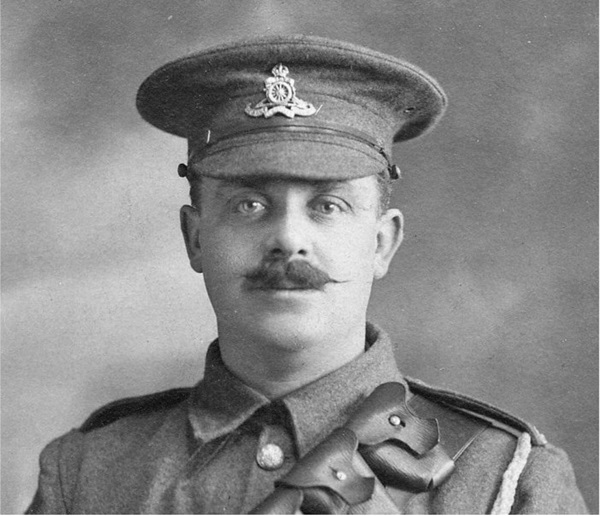Dan Fewster's Journals
An account of the experiences of a Royal Garrison Artillery Bombardier who served in German East Africa and France 1914-1919
Introduction
The Internet does forget. Personal web sites that lose their domain name registration or web hosting disappear. They become like archive boxes in a basement that have lost their labels, they don't exist. Sadly many personal web sites contain material created by ordinary individuals who played their part but not being famous their contributions become lost to history if other 'ordinary people' don't keep their record alive.
The material referenced here was originally created by Dan Fewster then organised and published by members of his family and their friends. Great-grandson John Hewson published these journals on the internet under the URL http://www.jfhopkin.karoo.net/DanFewster/Diary.html but this is no longer active.
I believe that Dan Fewster's Journals have historical value and need to be preserved and in that spirit they are re-published here and that that is in accord with Dan Fewster's family's wishes. I acknowledge and appreciate their contribution in keeping Dan Fewster's memories alive.
Dan Fewster

Who was Dan Fewster who left this record? He was born in Hull in 1874, one of a family of four children who were left fatherless when their father died in the age of 30. The children were brought up by aunts as their mother moved out of the area. In later life she ended up married in Hartpury in Gloucester where she is buried. Dan left school aged 11 and was employed on the railway, then in a shipyard before joining the Hull Brewery Co. where he remained until he retired. He joined the East Riding Volunteer Artillery. On the outbreak of war he immediately enlisted in the 1st Hull Heavy Battery which went into training on Hedon Racecourse. With his experience in the Volunteers it was not long before he was promoted to corporal and then sergeant.
What sort of a man was he? I recall him as an impressive figure. He struck me as a product of the Victorian age with a strong belief in the values of that era. He was described as "A Gentleman" by several people that knew him. His modesty is illustrated by the fact that he never makes any mention of, or gave any reason for, his award of a "Mention in Despatches". I would hazard a guess that it was connected with the battle of Duthumi and for the fact that for a period he was in command of what was left of the battery at a time when all the officers were absent sick.
Denis Hopkin, grandson.
Postscript
I have often been asked which of the two campaigns that I have been in was the more difficult. I have always replied that it was the East Africa one. This answer seems to surprise everyone who was not in East Africa for any length of time. I think two years in the field in East Africa was about the limit of a soldier’s endurance. The shortage and poorness of the rations, the scarcity of water, the long daily treks in terrible heat told its inevitable tale.
Malarial, Blackwater, enteric fevers and dysentery were rampant, to say nothing about such things as Veldt sores which covered men from head to foot with sores that almost made him frantic. Just imagine marching 20 or 24 miles in a temperature of 120 degrees in the shade, if you could find any. Before you started, your water bottle was filled and if you did not strike water that night, you had no more until the next morning. Thirst is a terrible thing and it is under these conditions that one finds this out. In France, you could always quench your thirst within an hour or so.
Also, I sincerely believe that all the flying and crawling insects in the world make East Africa their playground. They worry you by day and devour you by night. But perhaps the worst thing of all was the scarcity of news from home. The Field Post Office was in the hands of Indian staff. Whether they were careless and did not trouble to send the mail down the line, I do not know. I do know that a great number of my letters went astray. If one received a letter within three months of it being posted, one could count oneself extremely fortunate. I was once about 10 months without news from home, although my wife and daughter were writing every week. This is very trying when one knows that one’s family lives in an area that is constantly being raided by German aircraft. In France, we usually received letters seven or eight days after posting.
I freely admit that there was much more metal flying about in France and that there was a lot of gas, which was unknown in East Africa, but then one had good food and a decent supply of it. The climate was more congenial to our natures. One had spells off duty when things were a bit cushy. In France, one was troubled by only one kind of insect, not dozens of different species. And again, France was a civilised country, and East Africa, away from the larger towns was not. I would sooner hear a big shell travelling along like an express train, than hear a lion roar a few yards away. I have heard both very often, but a shell never made my flesh run up my spine until it turned my hair into pin wire.
If the same terrible time was to come again, and I had my choice, I should choose the civilised country. But let us trust that these times will never return. The whole affair is in the hands of the politicians, so let them make it impossible for a nation to run amok through the world again.
J. D. Fewster
The Journals of Dan Fewster